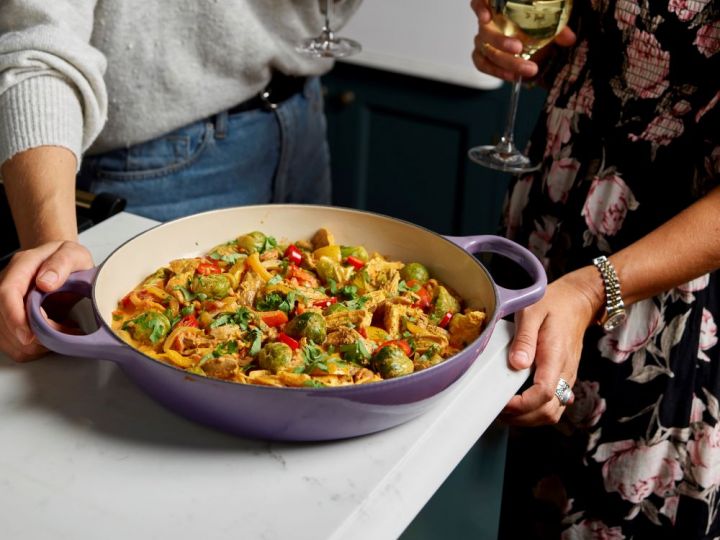Reflecting on Another Year in the Organic Farming Industry
For many, Christmas is a time to reflect on the past year and to share meaningful messages with the ones you love. There’s no denying that 2022 has been a difficult year for all of those involved in farming and food supply - with rising costs, supply chain challenges and drought and weather issues affecting the whole sector. This has led to inflation levels being at a 30 year high and farmers bearing increased costs.
Despite these challenges, our optimism remains strong that in the new year we will see better days. There is a growing movement in the farming community to shun the polluting practices borne out of the mid 20th century to produce as much food as possible by any means – towards a way of farming that benefits the soil, wildlife, and people alike.
Best wishes for peace, joy, love and happiness adorn Christmas cards all over the country, and so we wanted to take this moment to share our 12 hopes and wishes for a sustainable farming future.
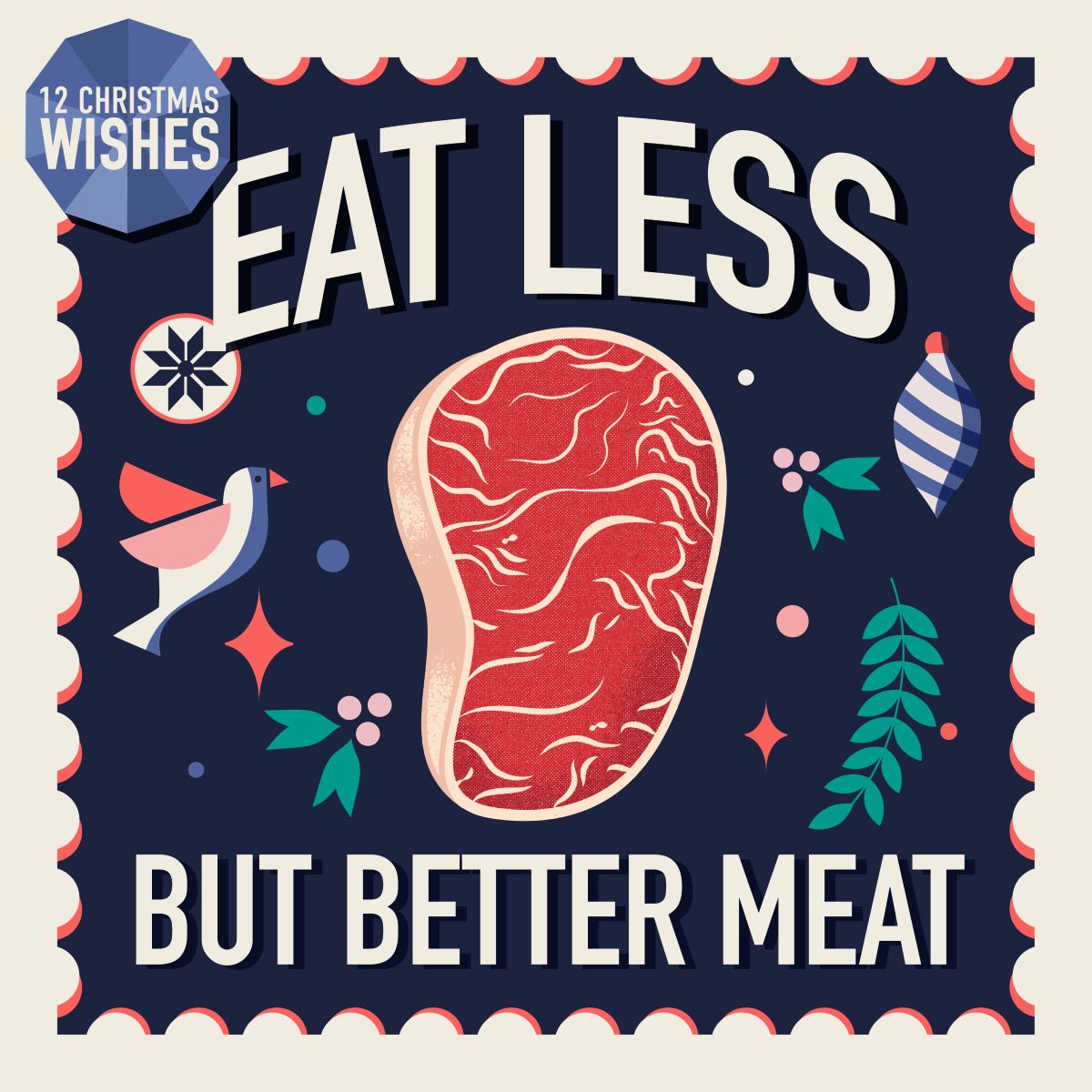
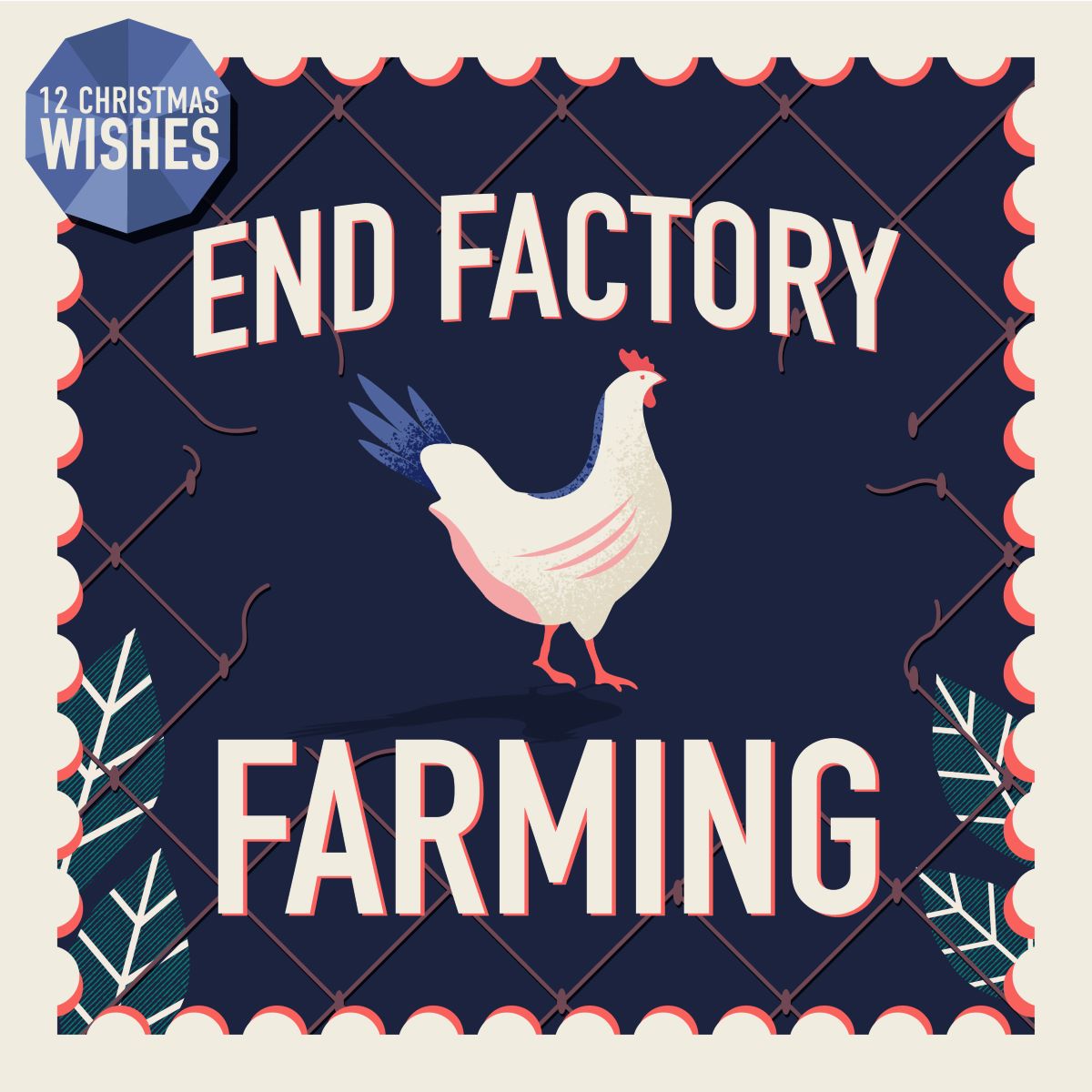
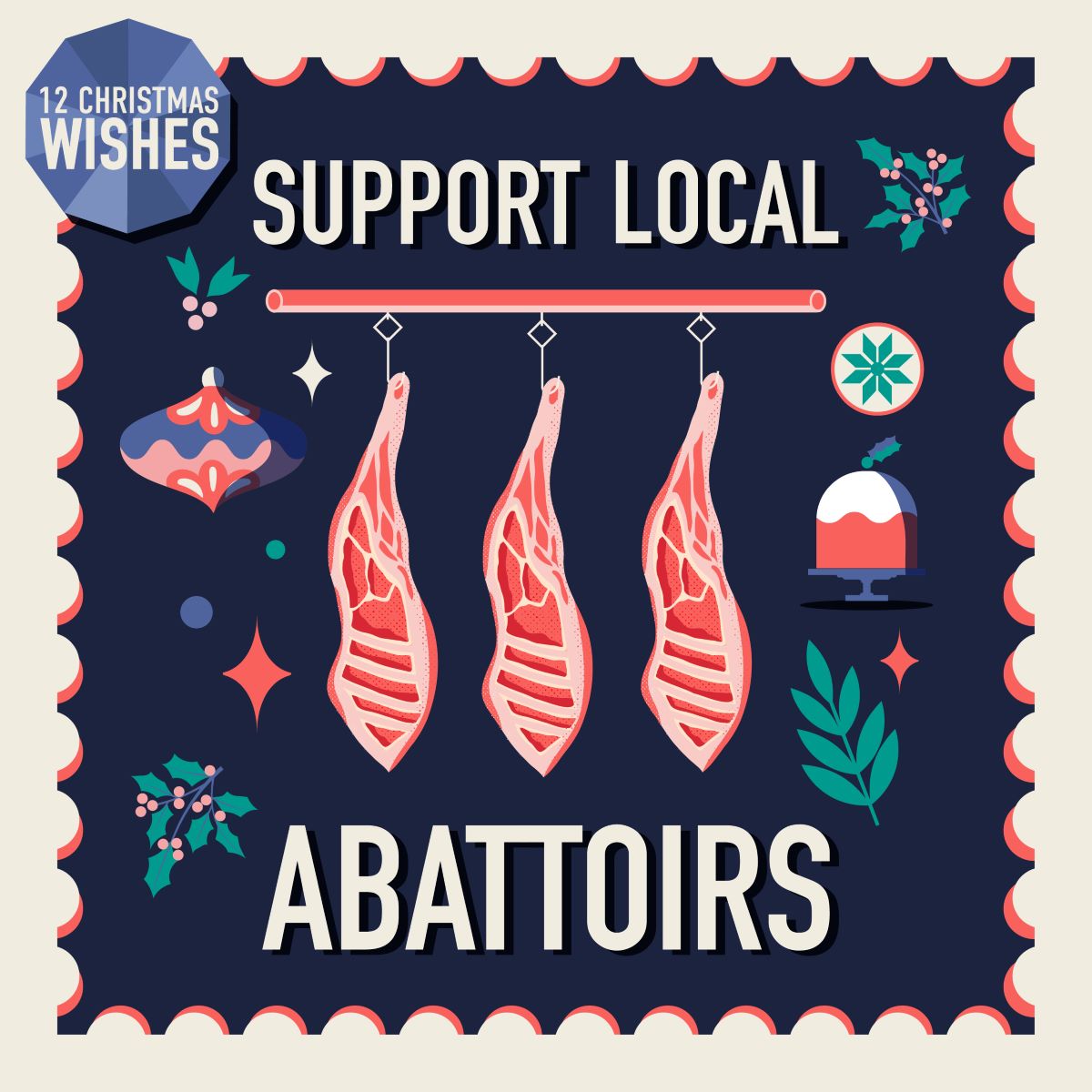

Christmas Wish #1 - Quality Over Quantity
As a nation, the amount of meat we eat has steadily increased, and for many, has moved from what was seen as luxury to an everyday staple. Britons consume twice as much protein as we need, and this has fuelled the rise of factory farms to meet such demand. Such intensive systems compromise animal welfare and have detrimental effects on the environment. But they will remain in place for as long as the demand for cheap meat does, which is why it’s so important to be mindful of the decisions being made with your wallet.
“Modelling at a European level found that while organic farming can feed everyone, with massive benefits for climate and nature, per capita consumption of ruminant meat will need to shift by at least 30-50% for such a scenario to be viable” says Rob Percival, Head of Food Policy at the Soil Association. “To make a nature-friendly – and humane – farming system possible, we must put a stop to the mega farms in the UK that house thousands of animals together.”
Buying less meat means that you can choose to spend a little more, allowing you to instead focus on better quality meat, that has been sustainably sourced. Buying organic meat means that the animals have been reared at the speed nature intended, on totally chemical-free diets, and farmed in a system that boosts biodiversity, improving soil health along the way. A healthy sustainable diet may focus some meals around meat, and others around sustainable fish, organic pulses and seasonal vegetables.
Christmas Wish #2 - End Factory Farming
Compassion In World Farming** predicts that 2 in every 3 farm animals are factory farmed - over 50 billion animals a year - in intensive systems that put profit and production above all else. And how do they achieve this productivity? By treating animals as commodities in intensive confinement with high dependence on large quantities of precious resources – grain-based feed, water, energy, and medication.
With intensive farming systems dominating our global meat production, it’s little wonder why so many campaign for an end to meat and dairy consumption to save the planet. But we believe there is a better way, a world in which “food production and nature recovery are woven together in a mosaic, with ruminant animals threaded throughout” says Rob Percival, Head of Food Policy at the Soil Association.***
Animal welfare is one of the most important aspects of organic farming. Organic standards insist that animals are given plenty of space and fresh air, and that they are raised in conditions that suit their natural behaviour. Small flocks and herds, and more access to the outdoors means organic animals don’t have to be routinely treated with antibiotics and wormers.
High welfare animals go on to provide significant benefits to our environment; as we harness the power of their manure to fertilise our fields without fossil fuels, regenerating our soils and boosting biodiversity. Not only that, but there is huge reward to be had in terms of the flavour found in meat from slow-grown and well cared for animals.
Christmas Wish #3 - Support Local Abattoirs
Local abattoirs play a vital role in all rural communities where farm animals are kept. When they close, it means that animals and meat must be transported much further away from the point of production, a scenario that has major animal welfare impacts and increased environmental pollution in the form of greenhouse gas emissions and air pollution in relation to longer journeys.
The Sustainable Food Trust (SFT) report that for several decades we have witnessed the gradual erosion of the UK’s network of small local abattoirs. In the last 10 years, 1 in 3 small abattoirs have closed. The demise of the small abattoir sector has coincided with the rise of multiple-retailing, and therefore the construction and further expansion of exceptionally large slaughterhouses who predominantly supply supermarkets.
We support the SFT in their call on national and local government bodies to recognise the benefits of slaughtering livestock as close to the point of production as possible, to take a constructive approach to the development of regulations for the introduction and use of mobile and small static on-farm red meat abattoirs to enable on-farm slaughtering, and to establish a task force to undertake an in-depth review of the UK’s smaller abattoir sector and make recommendations to ensure their prosperity in the future.
Christmas Wish #4 - Embrace the Nose To Tail Philosophy
Looking at the supermarket shelves, you might think pigs, cows and sheep were made up of legs, chops, steaks and mince. In reality, there’s a whole other butcher’s shop of cuts to be enjoyed and it’s our mission to bring them to you.
Before agriculture became industrial and commercialised, the countryside was a patchwork of smallholdings and modest farms. Animals lived in small flocks or herds and were treasured for milk, eggs and wool as well as for meat. This meant that when an animal was slaughtered, every last bit of the carcass was precious. With the idea of waste sitting very uneasily on our consciences, we’d like to encourage you to come with us on our nose-to-tail journey. Revive some of those old-school recipes your grandparents loved and discover all sorts of delicious cuts you’ve never heard of.
Try a rolled and stuffed lamb breast instead of a leg of lamb for Sunday lunch. Choose beef shin where you might use short ribs, or replace diced pork with pork cheeks to make a luscious, slow-cooked winter casserole. A whole chicken can provide a glut of meals with careful planning – after roasting the bird and eating the breast meat, save the delicious leg meat for a curry or stir fry before finally boiling the bones to make deliciously warming stock or soup. It takes a tiny bit of imagination, but we’re always here to help with ideas and we promise it’ll be worth it.
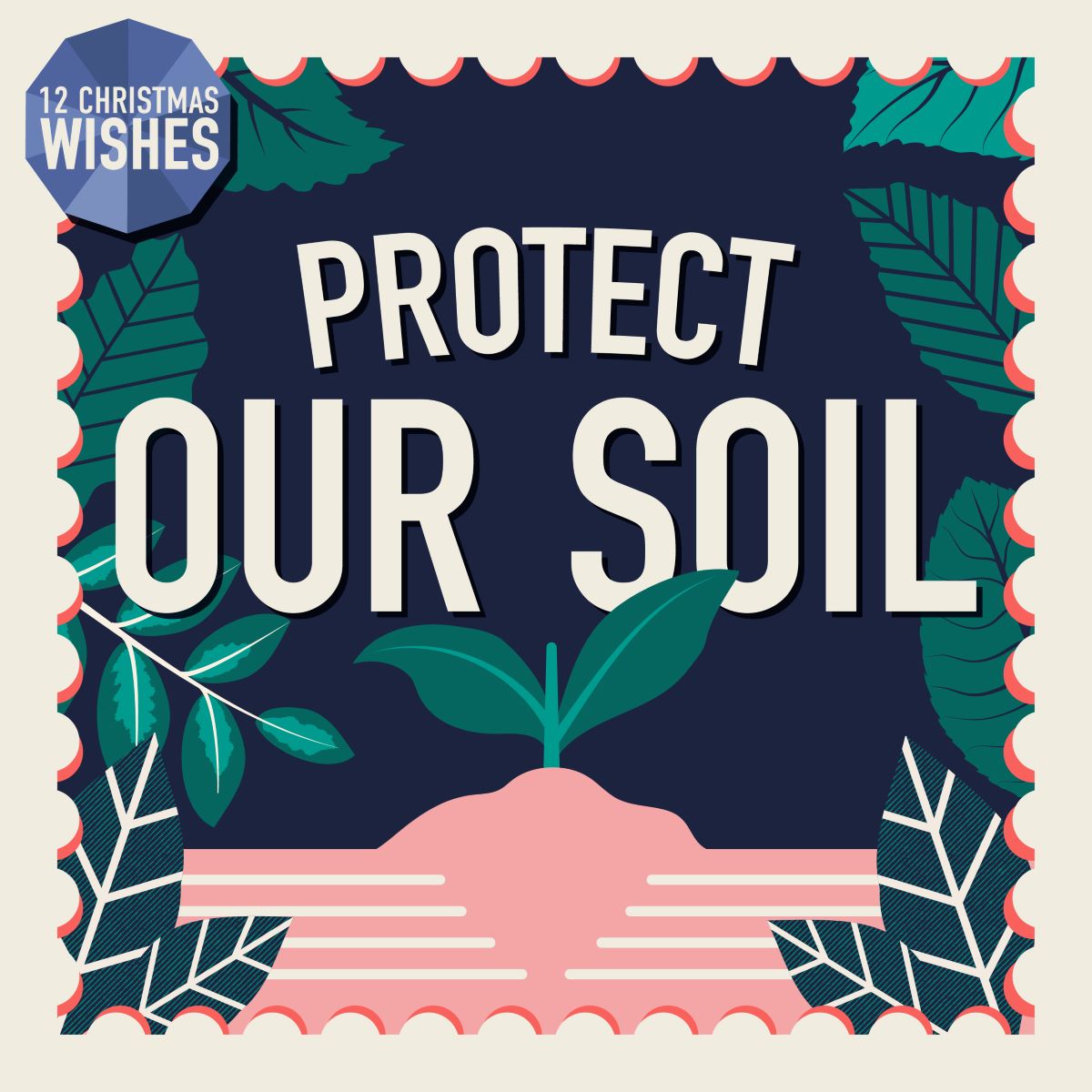

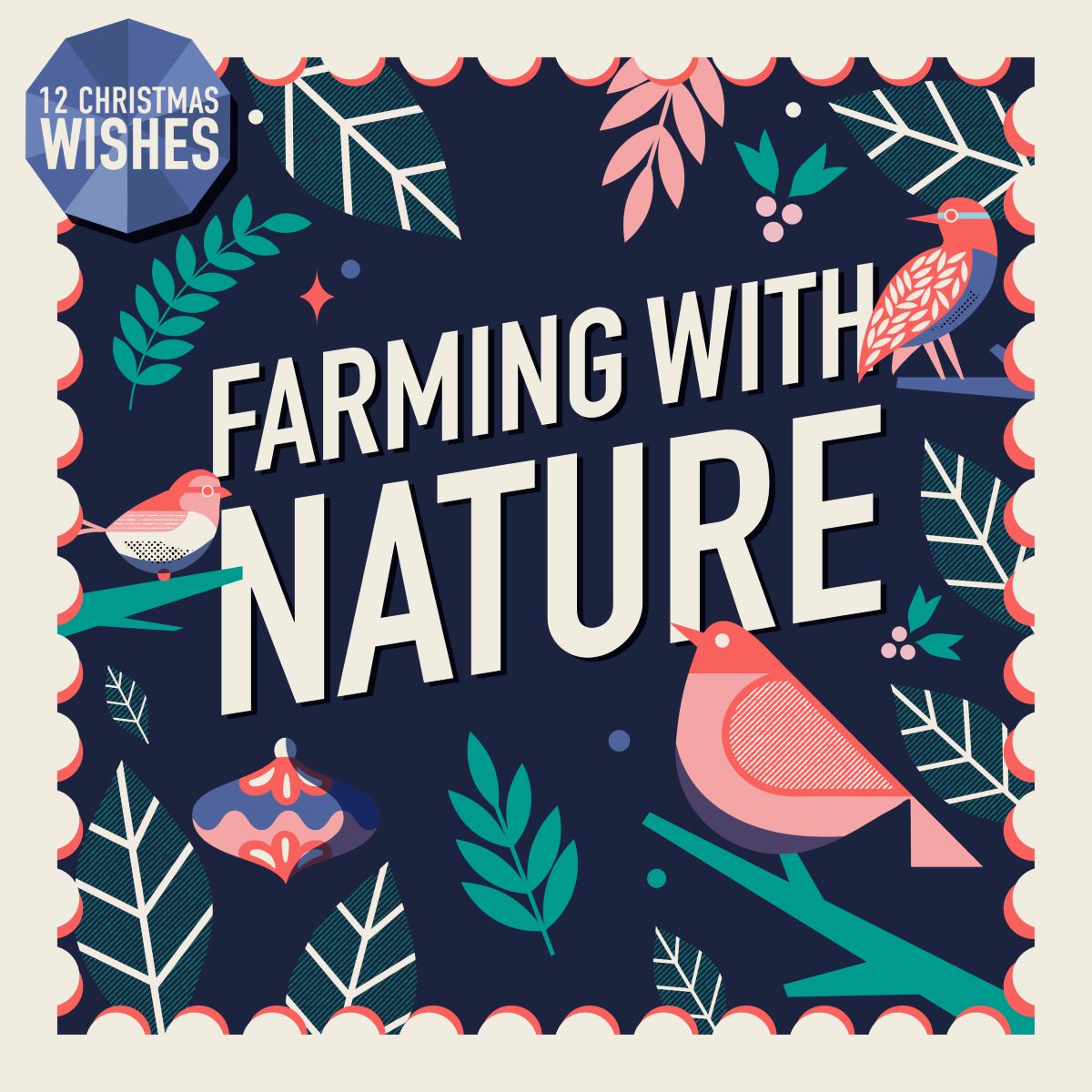
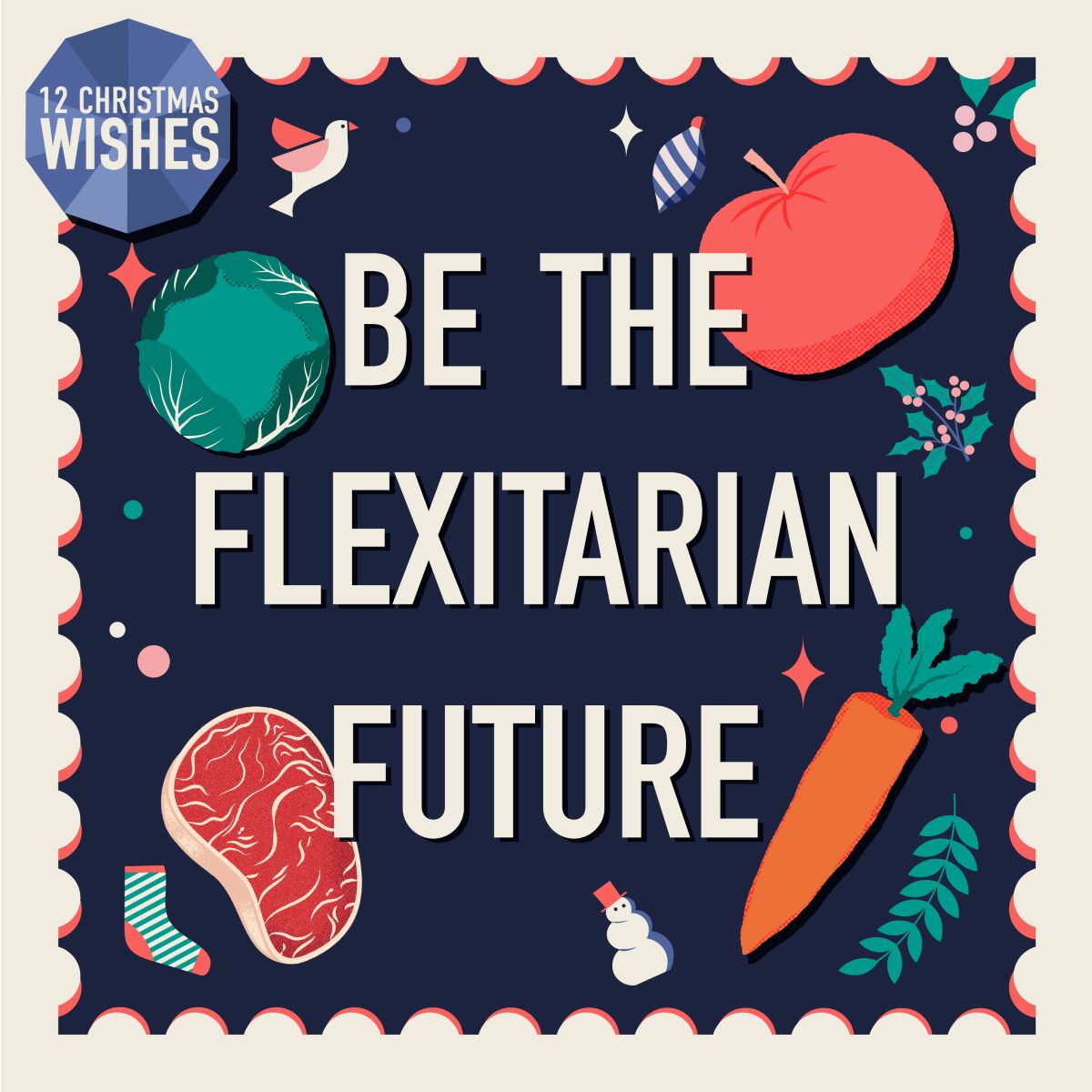
Christmas Wish #5 - Protect Our Soil
Soil…it’s just dirt right? Actually, soils are home to a quarter of the Earth’s species. They give us life, grow our food and provide a home for billions of organisms. And around 95% of food production relies on soil.
Sadly, we are losing nutrient-rich soils at an alarming rate, globally we are losing around 30 football pitches of fertile soil every minute.
One solution to protecting our soils is to support organic farming, a system that works with nature by building healthy soils. Organic farmers use regenerative farming practices such as building soil fertility naturally with compost and clover. Organic soils therefore have a diverse range of microbes living in it, helping crops to grow without artificial fertilisers. By increasing levels of organic matter, soil can better filter out pollutants, which in turn protects underground water supplies.
Christmas Wish #6 - End the Pollution
Our food and farming system is stuck on a chemical-reliant treadmill and we need it to stop for the health of our planet. The use of chemical fertilisers, pesticides and herbicides have devastating consequences for the natural equilibrium of our environment and are the leading cause of biodiversity loss, which is why they are severely restricted in organic farming.
Energy-hungry synthetic fertilisers, produced from burning fossil fuels, kill beneficial microorganisms in the soil that convert manure and plant remains into nutrient-rich organic matter, effectively stopping the soil from doing its amazing job in nature. It creates a self-perpetuating model, as the next time the farmer comes to plant a crop he has to rely on artificial fertilisers to do the job that his unhealthy soil can no longer support. Nitrogen- and phosphate-based synthetic fertilisers also leach into groundwater and increase its toxicity, causing water pollution.
Organic farming relies on natural alternatives, harnessing the power of livestock manure and careful crop rotation and cover cropping.
Christmas Wish #7 - Farming in Harmony with Nature
In the face of climate change and widespread decline in wildlife, the need to change our food system has never been greater. The “whole system’ approach used in organic attempts to address these issues in a joined up way to offer truly sustainable food for a growing population, in a way that works with nature. Organic standards demand that farmers foster biodiversity and protect sensitive habitats and landscape features.
Protecting nature isn’t just a condition of organic farming – it is the driving force behind its conception. The Soil Association was founded in 1946 by a group of people who were concerned about the health implications of increasingly intensive farming systems following the Second World War. Their main concerns were the loss of soil through erosion and depletion, decreased nutritional quality of food, exploitation of animals and the impact on the countryside and wildlife.
It's this respect for the natural world and ability to work with natural relationships and cycles that makes organic farming a solution that is better for the planet.
Christmas Wish #8 - Be The Flexitarian Future
Yes, you have read that correctly! Plant-based eating does not mean plants only - it’s about striking the right balance between quality meat, dairy, fish and eggs and a wide variety of plants.
Beans, pulses, nuts, seeds, grains, fruit, vegetables, herbs and spices give us valuable fibre and ‘photonutrients’ – plant micronutrients with many benefits for our health like antioxidants. Fibre and antioxidants feed our gut bacteria, the billions of microbes living in our large intestines. Gut microbes are impacted by food and lifestyle and are vital for a long, healthy life. 80% of our immune system lies on the within the wall of our gut and our gut microbes ensure it develops well and is properly regulated.
Plant-based eating is often misunderstood, it doesn’t describe the vital importance of animal foods in a sustainable diet, both in terms of the nutrients in animal products which fill vital gaps in nutrient intake from a plant-only diet, and their key role as grazing animals in ensuring our soils (and their microbes) thrive.
A plant-based diet can simply mean majority plant and minority animal foods on our plate. The balance of animal and plant food makes for a sustainable plate, ensuring healthy people, plants and animals all thrive together.
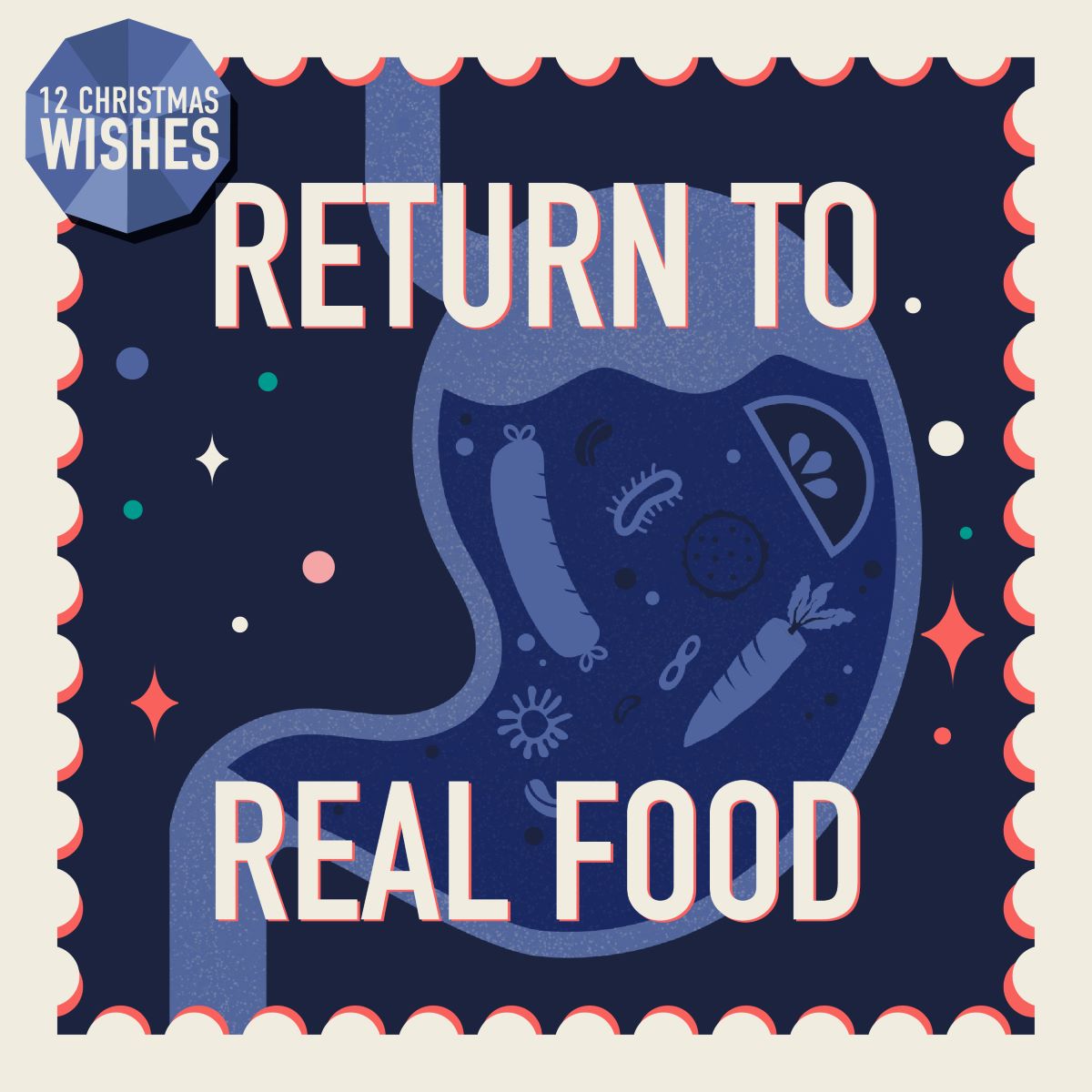
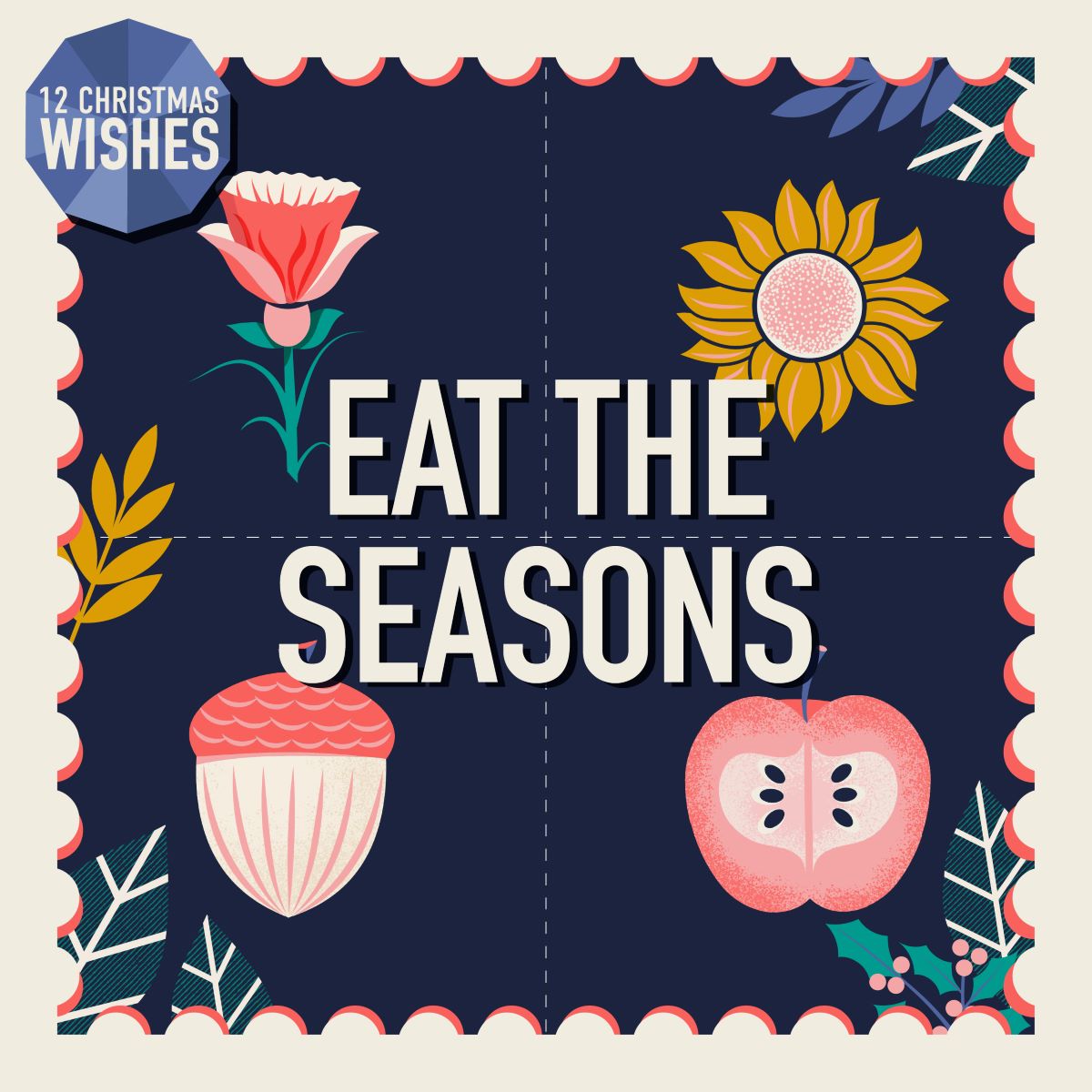
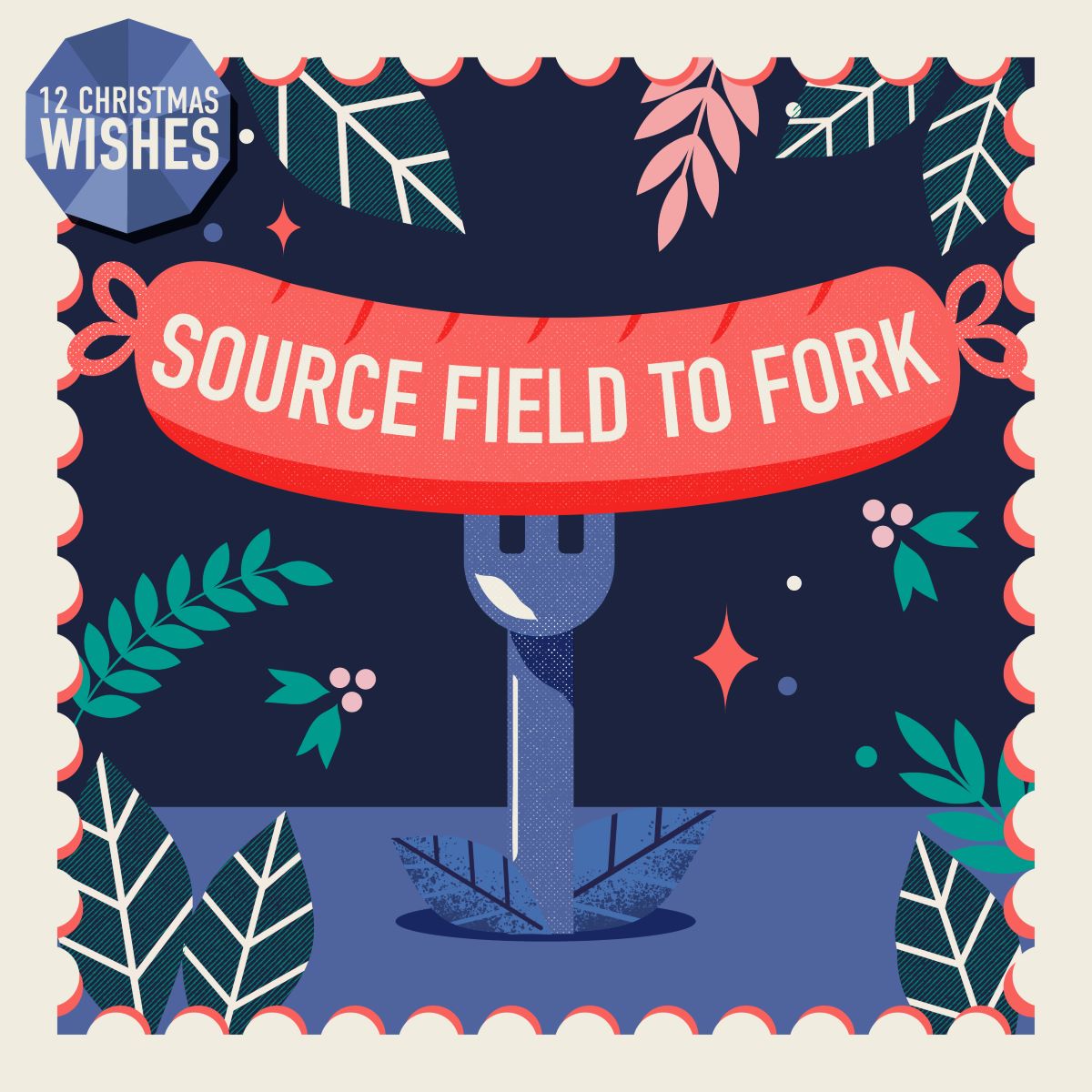
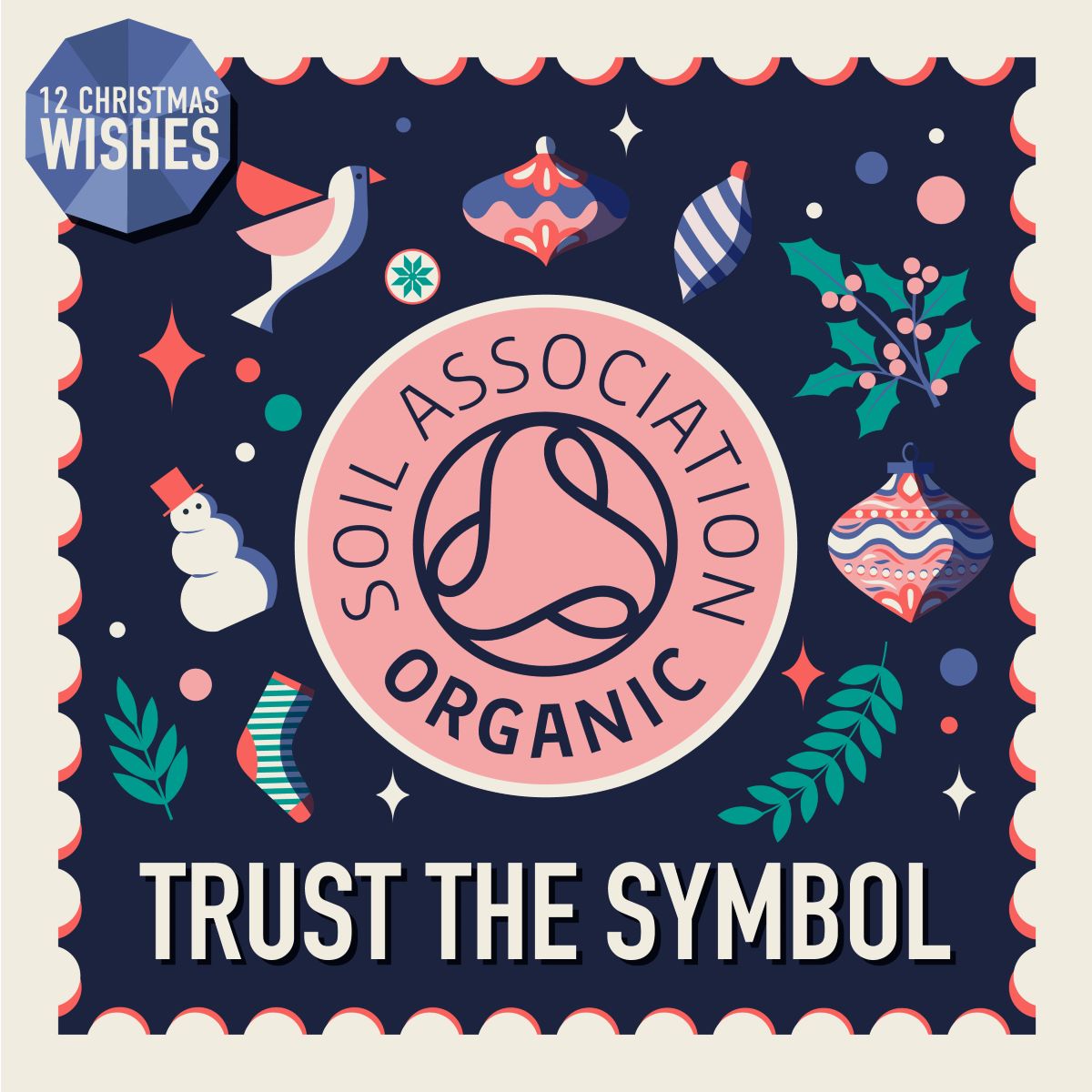
Christmas Wish #9 - Return To Real Food
Our microbiome is nurtured by the food we eat, and healthy, microbe-rich soils impact the nutrient density of our food. As these foods and the soils they come from are associated with microbe-rich restorative farming systems like organic, there is a beautiful golden thread between healthy soils, foods and our own gut microbes.
Evidence tells us that the healthiest diets are typically those based around a diverse mixture of whole foods – foods of plant and animal origin consumed largely as they are found in nature. Whole foods are often nutrient dense – packed with the good stuff. When eaten in the right balance, along with wholesome processed foods (many processed foods can be good for our health – it's ultra-processing that is the problem), these foods benefit our health, and when they are produced in agroecological or organic farming systems, they also benefit planetary health.
Gut microbes thrive on nutrient-rich food, and research shows that a diverse diet rich in minimally processed, high-fibre, plant-based foods, supports the growth of healthy ‘good’ gut microbes. Exciting new research in 2021 (Berry et al below) showed that high quality, minimally processed animal-based foods like fish, dairy and meat were also associated with a beneficial microbiome. Diets containing more highly processed plant-based food & less healthy animal-based foods, are more likely to be associated with “bad” gut microbes. This new research debunks the hard line debate about animal vs plant foods, and demonstrates how it’s important to strike a balance across food groups for our health and the health of our planet.
Asnicar, F., Berry, S.E., Valdes, A.M. et al (2021) Microbiome connections with host metabolism and habitual diet from 1.098 deeply phenotyped individuals. Nat Med 27, 321
Christmas Wish #10 - Eat The Seasons
There are many reasons why eating seasonally is a good idea. In our modern world we have become accustomed to buying what we want, when we want, and as a result we are losing touch with how and where our food is produced. The reality is that if we want to eat strawberries in the middle of winter, or winter veg during July, we are either eating imported food that comes with a carbon footprint, or food that is grown in energy-hungry artificial conditions.
Both of these processes cost money, and this cost gets passed on to the consumer. When you eat seasonally, local produce can be grown in natural conditions and easily transported to the shop making it much more affordable too.
And don’t even get us started on flavour! Flavour and freshness are compromised on long journeys in cargo holds and shipping containers. Seasonal produce travels much less and is harvested at the very best time to maximize taste. Foods that are grown and consumed during their appropriate seasons are more nutritionally dense, too, as the fruit and veg follow their natural growing and ripening rhythms.
Christmas Wish #11 - Source Field To Fork
Finding ways to source local and sustainable food - like organic - is more important than ever. The COVID 19 crisis and the ongoing climate emergency have highlighted the fragility of longer supply chains. When you buy directly from our farm, you are not putting your cash in the hands of a corporation whose goals are driven by profit and efficiencies. You are supporting a local community of farmers and butchers striving to do right by the planet and produce meat of outstanding quality.
From field to fork, our short supply chain guarantees traceability at every stage of the production process. Our set-up at The Organic Butchery is unique – our dedicated farmers rear the animals, send them to a local abattoir in a neighbouring village, we then butcher the meat in our organic butchery before packing your orders for delivery, all within a 7 mile radius.
Christmas Wish #12 - Know Your Labels
We know so many of our customers are trying to do the right thing, but all the sustainability terms can be so confusing and difficult to understand. We fully support the development of Environmental Labelling on food & drinks products that will further help consumers in making better and more informed choices for themselves and the planet. We need to make sure that this label is as clear and transparent as possible, as well as avoiding any potential greenwashing which could mislead consumers.
Until this is introduced, a symbol you can always trust is organic. Organic food must be certified by law, so you can be assured that the product and ingredients come from verified sources. You may see companies saying things in their marketing like, ‘as good as organic’, ‘reared organically/to organic standards’, and but these are claims that cannot be verified or legislated by an independent body like the Soil Association, who inspect farms and food companies at least once a year to ensure they are complying with the strict conditions on how their food is produced, processed and handled at every stage.
Equally, whilst farming systems described as agroecology and regenerative are similar to organic – and some principles of each are mutually inclusive – organic remains uniquely enshrined by law and underpinned by thorough accreditation.
Choosing organic means you are supporting farming practices with a more traceable production process and you’ll always know what’s in your food. It means higher levels of animal welfare, lower levels of pesticides, no manufactured herbicides or artificial fertilisers, and more environmentally sustainable management of farmland and the natural environment – this means more wildlife!
*Cost of living crisis and organic - Soil Association / ** https://www.ciwf.org.uk/factory-farming/ / ***Organic and nature-friendly farming - Soil Association




